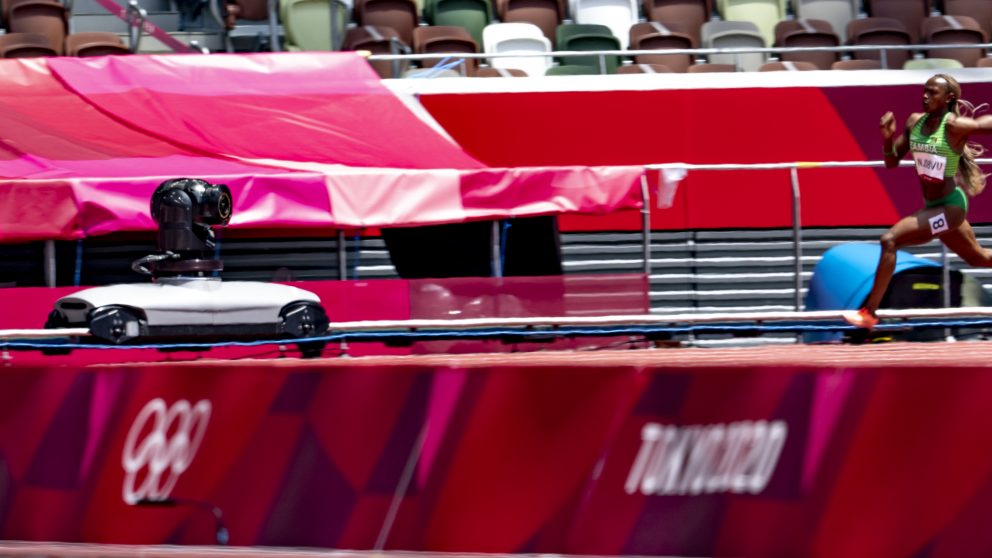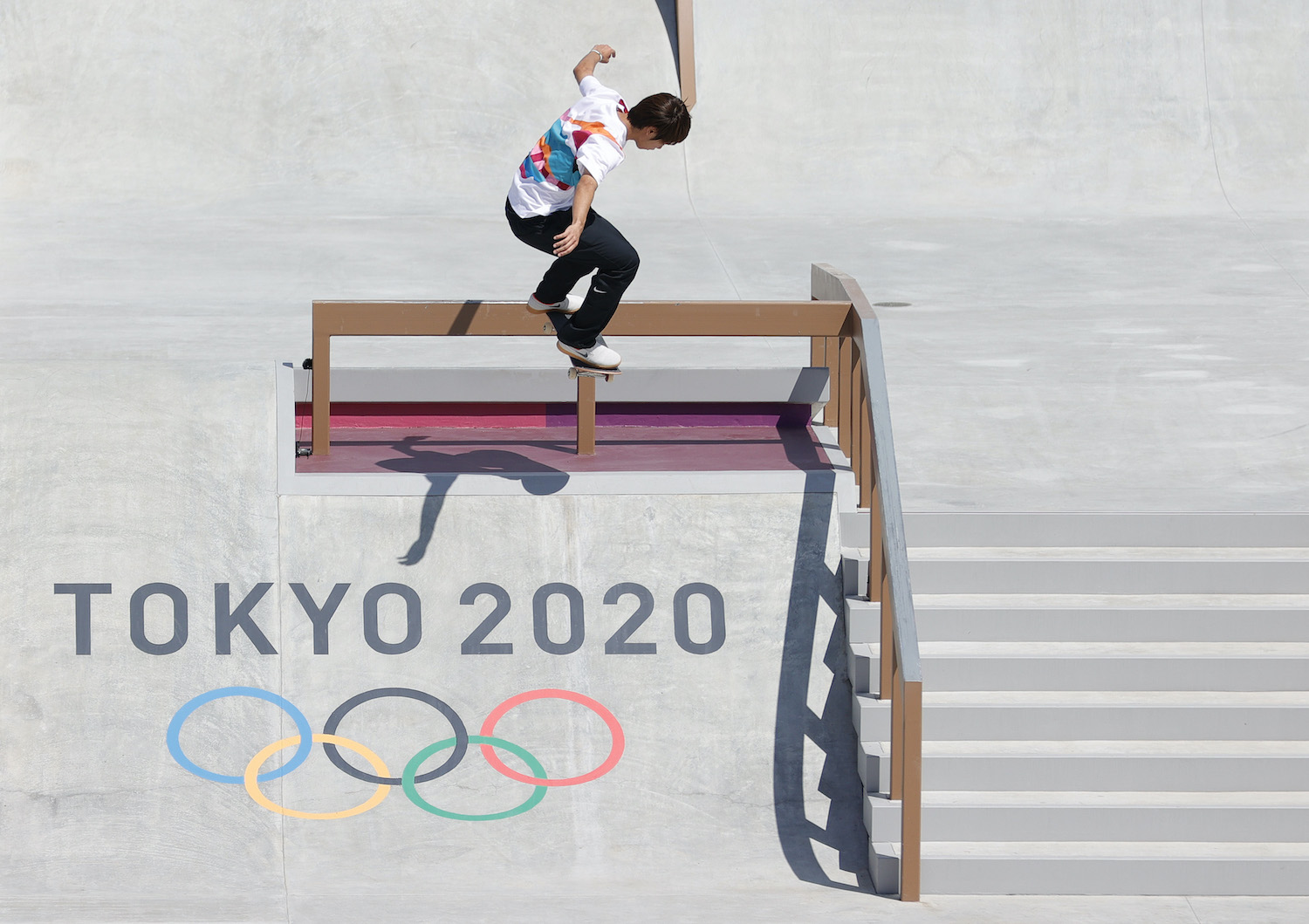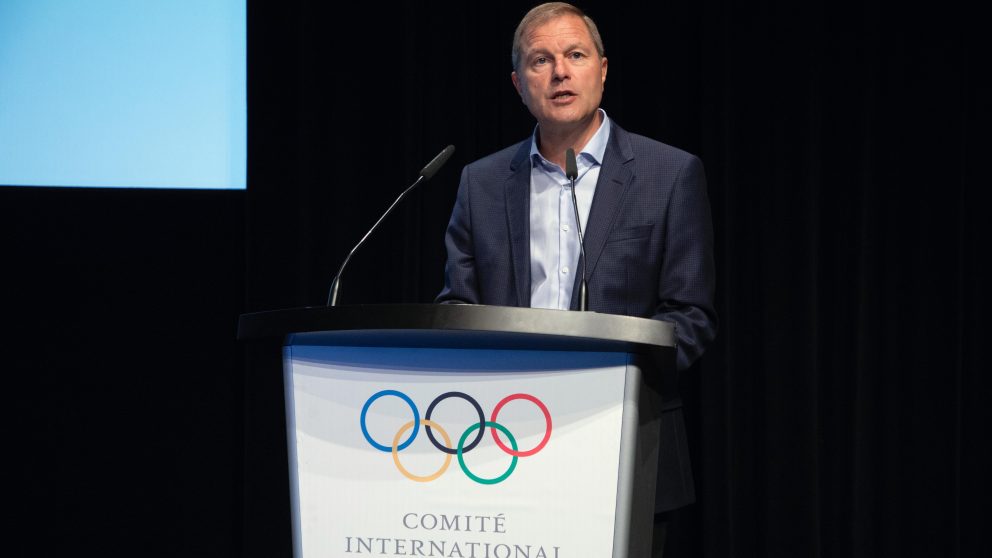
The streaming Olympics Tokyo 2020 paves way for a digital experience at Beijing 2022. Photo: ©2021-IOC-All rights reserved Tokyo 2020
The Olympic Games set the gold standard in terms of marketing and sponsorship as the world’s largest sporting event.
Innovations at Tokyo 2020 spanned an accelerated shift to digital media and adoption of cloud computing. They are likely to be applied again at Beijing 2022 and Paris 2024, said the International Olympic Committee (IOC’s) Managing Director of Television and Marketing Services Timo Lumme.
In a wide-ranging conversation, Lumme explains how real-time marketing by brands took off at Tokyo 2020 and how the Olympic Games’ sponsorship program has evolved into partnerships in areas such as cloud computing.
As an example, Hangzhou-headquartered Alibaba Group is the official cloud technology and e-commerce services partner of the Olympic Games Tokyo 2020 and a member of the TOP program.
Lumme also discusses the shifting media landscape and how the inclusion of new sports by the Olympic Games, such as skateboarding and surfing, attracted younger audiences. At Paris 2024, a competitive form of break dancing will make its debut.
Finnish Lumme is responsible for the sale of all broadcast rights to Olympic Games coverage. Lumme also overseas the negotiation and sale of Worldwide Olympic Partnerships as well as the management of the IOC’s global sponsorship program known as TOP.
The following excerpts from the interview have been edited for clarity and brevity
Q: How did the coronavirus pandemic impact viewership and engagement with the Olympic Games?
What we’ve seen, from athletes and the public at large, is that they really wanted something on which they could focus and celebrate. So, we’ve seen massive engagement and very, very solid global viewership.
How people communicate, engage with sports events, or indeed view sports events such as the Olympic Games, is undergoing a massive transition. Now you can connect through social media; you can connect through official platforms such as olympics.com.
We saw record traffic on these platforms; there were more than 175 million unique users on the Olympics web app for Tokyo, double the traffic of Rio 2016.
Also, the whole viewing experience on television is now transferring to streaming. We thought it would happen over the next few years, but we’ve seen it play out at Tokyo 2020.
Q: Are you seeing brands being nimbler in response to the digital shift in viewership and swiftly reallocating marketing dollars accordingly?
This is absolutely true. Real-time marketing, as some people call it, is a reality.
Many of the experiences and lessons have been learned from Alibaba and how it conducts business in terms of data management and being able to make sure that advertisers or sponsors can reallocate their spend against content to reach and engage with specific-affinity audiences instantaneously. It’s something that we’re also developing at our digital platforms.
Today’s marketing is all about being current and relevant and to surprise and delight your audiences with messages and ways of engagement.
The Olympic Movement is going to continue to work with Alibaba to make sure that we can tap into its undoubted expertise and market-leading analytics technology.
Q: How are brands leveraging real-time insights and analytics in response to news at the Olympic Games?
Yes, we see touchpoints all the time. There’s constant realignment or campaigning around specific events, whether it’s a medal win for an athlete that resonates in a particular market or some other noteworthy event happening around either the Olympic Games, the team, or an athlete.
This is part of today’s marketing approach; to be nimble, light-footed, acquire and apply data. Brands also need to be able to shift marketing dollars onto platforms, particularly digital platforms, that can then provide an immediate return, based on events that may be unfolding or have happened very, very recently.

Q: How are new sports, such as skateboarding and surfing, changing the Olympic Games’ audience demographics?
The Olympic Games constantly evolve.
We have structured ourselves in such a way that we can add new sports to the program, and many of these new sports have come up through particular communities of youth culture.
These sorts of sports, excite and mobilize the communities around them, many of whom are not only fans or participants of these sports, but also adhere to a type of lifestyle code around them.
We’re really excited to be able to attract and invite these communities, many of whom are young people, to become fans of the Olympic Games. They’re super-served in terms of their Olympic fandom.
In terms of the second question, the Olympic Games really prides itself on introducing new, young generations every two years to sport. What we’re doing is creating huge communities of sports lovers. Where you’re able to attract young people consistently is also very exciting for the brands involved with the Olympic Games.
Q: Athletes are becoming influencers in their own right. How do you regard this trend?
It’s very welcome. Firstly, in terms of promoting the Olympic brand, our best ambassadors are the athletes at the end of the day. For them to have sizable social media followings is really, really important and very, very welcome.
Secondly, for the development of their brands, it’s also very important for them. The Olympic Movement provides lots of support for athletes; in fact, 90% of everything we generate goes back out into the support system [for athletes].
But athletes need to be able to generate help and support for themselves. So the fact that they’re able to mobilize their own social media platforms really, really helps in that engagement with potential corporate partners.

Q: How is sponsorship of the Olympic Games evolving?
We happen to have one of the most well-established [programs]. The TOP program, of which Alibaba is a member, started back in 1985.
In the context of sponsorship, I’d point to three areas: one is the underlying association and alignment with values. In the case of the Olympic Games, we’re talking about the values of excellence, friendship and respect. These are becoming more and more important because young people adhere to them and align with them more than ever before.
Digitization, again, is important and we’ve worked very hard to create digital platforms that give us direct relationships with fans. We’re going to bring to bear the best of digital competencies, many of them working with Alibaba, to make sure that we’re able to serve up the content that fans want and is most relevant to them.
Thirdly, and this is perhaps a little bit more specific to the Olympic Games that don’t have on-field, perimeter branding, we’re very keen to integrate our TOP partners into the organization of the Olympic Games. For example, Alibaba brings us e-commerce solutions in China, on [marketplaces] Taobao and Tmall, but also importantly, provides the backbone of a lot of the organization of the Olympic Games, such as broadcasting with cloud solutions.
We continue to find these connection points where the TOP partners can provide us essential services and products that are integrated into the organization of the Olympic Games, and this sometimes also means that there is some on-field visibility.
Any company that illegitimately tries to associate itself with any of the Olympic touchpoints and Olympic brands is a cheat
Q: What is your attitude towards ambush marketing of the Olympic Games? How do you handle non-affiliated marketing?
Let’s be very clear: the Olympic Movement, the staging and organization of the Olympic Games, the help towards athletes fulfilling their objectives, is only possible because we have a corporate sponsorship program entitled TOP.
Any company that illegitimately tries to associate itself with any of the Olympic touchpoints and Olympic brands is a cheat. Let’s say it for what it is; they are cheats. It’s an unacceptable way to conduct business.
If I were a shareholder in any of these companies, I would be horrified because it is essentially saying that you are happy to be a cheat; and how does that reflect on the company itself?
Having said that, over the years the Olympic Games has put quite a lot of effort into educating people and the corporate sector about what is the right thing to do and what is not the right thing to do, so these examples are relatively few and far between. Of course, they do occasionally occur, sometimes not necessarily with malicious intent, but because of perhaps a lack of knowledge or ignorance.
We do patrol this very, very carefully. We have teams monitoring broadcasts and digital destinations continuously, and we have a reporting structure for this. We also work very closely with the various social media platforms to make sure that we minimize this.
Lastly, I would say it’s also my job to protect the position of our official sponsors so that they don’t have unofficial or illegitimate entities running a disturbance on legitimate companies’ and sponsors’ activities.
Q: How is the average value of sponsorship trending in Tokyo 2020 vs. previous Olympic Games?
The sponsorship market around the Olympic Games is very healthy. You’ve seen a record level of revenue for the domestic program in Tokyo. We also see very healthy programs in Beijing and now Paris. So, in general terms, it’s in good shape.
This is led by the health and robustness of the TOP program. We have partners, such as in Alibaba’s case, that have signed an agreement through 2028. We have partners who have signed agreements through Brisbane 2032, which is a very clear demonstration of confidence.
That being said, we’re really talking about strategic partnerships. These are not off-the-shelf types of products. They are frameworks with certain rights, but they represent an opportunity to build a strategic partnership whereby both parties are winners. This takes work and means, in the main, very bespoke and customized ROI [return on investment] models.
We’ve definitely had some challenges around the pandemic. We’re happy that we’ve been able to stage Tokyo 2020. We’ve had to be very agile, and our partners have had to be very flexible and agile to accommodate all the issues of uncertainty around the pandemic. Still, we’re quite sure that the fundamentals of marketing the Olympic Games continue to grow stronger as we move towards Beijing 2022.
Q: Do you see a rise in Asian brand sponsorship, stimulated by Tokyo 2020 and heading into Beijing 2022?
Yes, that’s absolutely right. When Tokyo was chosen as the host city for 2020, going back to September 2013, we saw this coming through.
The TOP program is somewhat unique in the sense that we have a very global representation in terms of our corporate partners. But when a city hosts the Olympic Games it helps because it is such a stimulant to national pride. [Nine in 10 Japanese watched some coverage of Tokyo 2020.]
We will continue to come back to Asia for the Olympic Games. Brisbane 2032 will be in Asia’s time zones. We’ve seen such huge success from the Olympic Winter Games Pyeongchang 2018, at Tokyo 2020, and we’re very, very much looking forward to and excited about Beijing 2022.
What better way to get “Olympic fever” than when your local athletes are winning medals.
In our Summer Games we have more than 80 countries that win medals, that’s about 40% of participating NOCs [National Olympic Committees] that win medals, and this trend is moving upwards.
An indicator of success is different countries producing elite athletes. It’s an important area and part of the build out of the Olympic Games’ brand to render it evermore universal.
To receive the latest news directly in your inbox, sign up for the weekly Alizila newsletter




